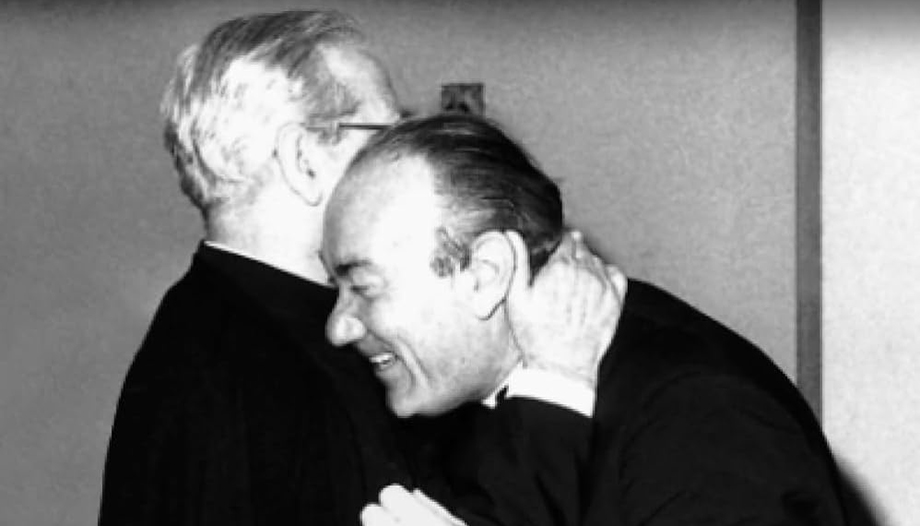If he were still alive, he would be a shining example of that "Church on the move" so dear to Pope Francis. An adventurous life, marked by an encounter with a saint and ended surrounded by the affection of thousands of people who knew and loved him as their pastor for about 25 years, in one of the most turbulent and degraded suburbs of Rome.
It is Francesco Angelicchio, who, as a young and promising lawyer, met St. Josemaría Escrivá. His life then took a totally new and unexpected turn.
On Thursday, March 7, he was remembered with the presentation of the book "The first Italian of Opus Dei", written by his nephew Fabio, a journalist for La7, in the church of San Giovanni Battista al Collatino, where the priest was parish priest for about 25 years, next to the Elis centerSince 1965 it has been a beacon of formation and aggregation not only for the popular district of Casalbruciato, but for the whole of central-southern Italy.
A "miraculous" escape
An adventurous life from a very young age, that of Francesco Angelicchio. Operations officer on the Yugoslavian front during the Second World War, then paratrooper in the Folgore, he miraculously escaped from the massacre of the Fosse Ardeatine.
"His mother, my grandmother, knew a monk at the Abbey of San Paolo fuori le Mura," says Fabio Angelicchio, "and during the German occupation he was allowed to hide in the convent. It was the first time he wore a cassock...".
Then came the infamous abbey raid on the night of February 3 to 4: "My uncle was waiting to be searched and taken away; he would surely have ended up at the Fosse Ardeatine. Instead, while in line, he asked to go to the bathroom. He was allowed to do so before being searched, so he hid there and was 'forgotten', managing to save himself."
Cinema and Gospel
After the war, the young Angelicchio met the first Spanish members of the Work who had arrived in Italy to begin apostolic work, and at Christmas 1947 he met for the first time the Founder, who affectionately called him "my first-born Italian".
Ordained a priest in 1955, he found himself in a position that meant a lot in his life, although at first he wanted to refuse it. In fact, he was called by St. John XXIII to found the Catholic Film Center.
St. Paul VI then asked him to choose the films to be shown to the Pope. This led him to befriend many show business personalities, who were certainly not Church people.
However, St. Josemaría encouraged him, as he himself recounted and as his nephew recalls in the book: "Father (the name by which he referred to the Prelate of Opus Dei, ed. Checco and he would tell me: you have to stand on the edge of the abyss; I will catch you with one hand and with the other you try to catch a soul that is about to end up there".
Personalities such as Alberto Sordi, who later donated the land to build the senior citizens' center attached to the Biomedical Campus, were friends of Francesco: when he was not yet a well-known actor, they used to go together to the theaters to play claque?
Also present were Federico Fellini and Giulietta Masina, Roberto Rossellini, Liliana Cavani, who signed the preface to Fabio's book, and Pierpaolo Pasolini, who at the suggestion of Fr. Francesco returned to the set of "The Gospel according to St. Matthew" to reshoot some scenes that did not conform to the Gospel text.
Parish priest in difficult times
Then, in the early 1970s, he was appointed pastor of the church of San Giovanni Battista al Collatino, where he left an indelible mark.
Those were difficult years: on the walls there were threatening writings against priests and fascists, houses were occupied, barricades were erected in the streets with burning tires and the neighborhood was also affected by the murderous fury of leftist terrorism.
However, Francis rolled up his sleeves. St. Josemaría told him to go out to meet the people, who otherwise would not come to him. And so he did.
He would enter houses, with the excuse of blessings, to talk to people and take an interest in their problems. He would go to visit parishioners who had gone to jail. He would stop in the street and invite for coffee the young people who moments before had insulted him by calling him "bacarozzo", or cockroach.
An extroverted priest who knew how to win the esteem and affection of so many people, as several testimonies during the meeting recounted, in a difficult neighborhood marked by drugs, delinquency, social marginalization, poverty and a generalized Marxist anti-clericalism.
Don Francesco died at the age of 88, in the same center in Elis, in November 2009, exactly 15 years ago.
His legacy? His smile, his typically Roman humor and an unwavering loyalty to his vocation, translated into a life spent in the service of the Church and others.
-Rome









